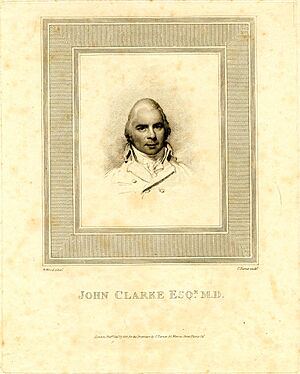John Clarke (physician, 1761–1815) facts for kids
John Clarke (1761–1815) was an important English doctor and expert in childbirth. He was known for his work with pregnant women and children.
A Doctor's Life
John Clarke was born in 1761 in Wellingborough, England. His father was also a surgeon. John went to St. Paul's School in London when he was 11. Later, he studied at St. George's Hospital.
After finishing his studies, he became a member of the Corporation of Surgeons. This was a group of surgeons that later became the Royal College of Surgeons. John Clarke started his own medical practice in Chancery Lane, London.
He also taught about childbirth (midwifery) at a special medical school. His lessons were very popular. He used simple examples to explain difficult medical ideas.
In 1787, John Clarke received a special license to practice midwifery from the Royal College of Physicians. He also earned a medical degree from Scotland. For many years, he was one of London's top doctors for childbirth.
Later in his life, he stopped focusing only on childbirth. He moved to a different part of London and became a specialist in diseases that affected women and children. He also taught about childbirth at St Bartholomew's Hospital.
John Clarke passed away in August 1815.
His Important Work
John Clarke wrote several important books about medicine. He also wrote a paper about a special kind of growth on the placenta, which is an organ that helps a baby grow inside its mother.
His most famous work is a book called Commentaries on some of the most important Diseases of Children. He only finished the first part of this book before he died in 1815.
In this book, he made a very important discovery. He was the first person to accurately describe a disease called laryngismus stridulus. Today, we sometimes call it tetany.
This disease causes sudden problems with breathing. It looks like the windpipe (the tube to the lungs) is closing up. Before Clarke's work, doctors often confused it with other breathing problems like asthma or croup.
John Clarke's clear description of laryngismus stridulus was the first step to truly understanding this condition. Because of his detailed observations, he is remembered as an important medical discoverer.
 | William Lucy |
 | Charles Hayes |
 | Cleveland Robinson |


